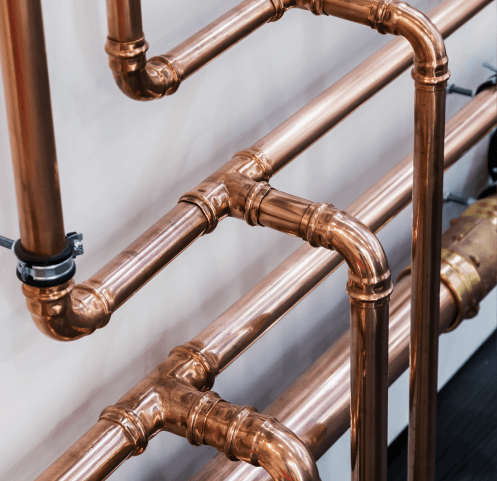ANNEALING OVENS
WHAT IS ANNEALING?
Annealing is a heat treatment process used to alter the physical and sometimes chemical properties of a material, typically metal. The process of annealing metal involves using ovens to heat the material to a specific temperature, maintain that temperature for a period of time, and then cooling it slowly, usually in the oven or furnace. Precise control of temperature and time is critical for the process to succeed. Additionally the atmosphere must be carefully controlled to prevent oxidation and maintain surface quality.
Why is annealing performed during the Manufacturing Process?
-
Relieving Internal Stresses
: Metals often develop internal stresses during processes like rolling, drawing, forging, or welding. Annealing helps relieve these stresses, preventing warping, cracking, or other distortions that could occur during subsequent manufacturing steps. -
Improving Ductility and Toughness
: By softening the metal, annealing increases its ductility, allowing it to be formed, bent, or shaped more easily without breaking. -
Refining Microstructure
: Annealing can refine the grain structure of the metal, leading to improved mechanical properties like strength, toughness, and uniformity. -
Restoring Workability
: Metals can become work-hardened or brittle after repeated deformation or machining. The annealing metal process restores their workability, making them easier to machine or form. -
Enhancing Electrical and Magnetic Properties
: In certain materials, annealing can optimize electrical conductivity or magnetic properties, which is crucial for specific industrial applications.
Metals Most Commonly Subjected to Annealing
-
Steel (Carbon and Alloy Steels)
: Annealing is commonly used in carbon steels, alloy steels, and stainless steels to soften the material for further processing or to achieve a desired microstructure. -
Copper and Copper Alloys
: Copper is annealed to improve its ductility and electrical conductivity, which is particularly important in the production of electrical wiring and components. -
Aluminum and Aluminum Alloys
: Aluminum alloys are annealed to restore ductility after work hardening and to prepare them for further processing like forming or machining. -
Brass
: Brass is annealed to enhance its workability, making it easier to draw or form into complex shapes. -
Nickel and Nickel Alloys
: Annealing is used to relieve stresses and improve the mechanical properties of nickel-based alloys, which are often used in high-temperature applications.

cyclone Technology™ and the annealing process
Horizon Performance Technologies’ ovens equipped with Cyclone Technology™ are engineered for exceptional control, efficiency, and consistency in heat treatment processes such as annealing. Here’s how they stand out in each stage of the annealing process:
-
Recovery Stage
The recovery stage is where internal stresses in the material begin to alleviate without any significant change to its microstructure. Horizon’s ovens with Cyclone Technology™ provide a uniform heat distribution through advanced airflow management, ensuring that the entire load reaches the required temperature evenly. This precise control prevents uneven heating that could lead to residual stresses or inconsistent material properties. The high-efficiency circulation of heat minimizes energy use, offering both cost savings and sustainability benefits.
-
Recrystallization Stage
During the recrystallization stage, new grain structures form as the metal is held at a temperature above its recrystallization point. Horizon ovens, utilizing Cyclone Technology™, excel at maintaining tight temperature uniformity. The consistent airflow allows for precise regulation of the oven environment, essential for achieving homogenous grain formation across the entire load. This ensures that all parts of the material undergo recrystallization simultaneously, resulting in uniform mechanical properties. Horizon’s precise temperature control prevents overheating or underheating, which could lead to defects or variations in the final product.
-
Grain Growth Stage
Controlled grain growth is crucial for achieving the desired balance between strength and ductility. The advanced Cyclone Technology™ in Horizon ovens promotes an even heat profile, supporting controlled grain growth without the risk of localized overheating. The consistent thermal environment helps regulate the rate at which grains increase in size, leading to optimized material characteristics. This technology prevents rapid temperature fluctuations that could cause excessive grain growth, which would weaken the final product.
-
Cooling Stage
The cooling stage is just as vital as the heating phases. Improper cooling can introduce new stresses or distortions. Horizon ovens are equipped to provide carefully controlled cooling rates that can be tailored to specific material needs. The superior heat exchange capabilities of Cyclone Technology™ allow for a gradual and consistent cooldown, preventing warping or cracking. This controlled approach helps maintain the refined microstructure achieved during the previous stages, resulting in superior mechanical and surface properties.
Why Horizon Ovens provide Superior results

-
Uniform Heat Distribution:
The patented Cyclone Technology™ ensures that every part of the load receives consistent airflow and temperature, eliminating hot and cold spots. -
Energy Efficiency:
Designed for sustainability, Horizon ovens use less energy while maintaining peak performance, reducing operational costs without compromising quality. -
Customizable Control:
Users benefit from advanced control systems that allow fine-tuning of the heating and cooling cycles to meet the specific needs of different metals and batch sizes. -
Reliability and Precision:
Horizon’s robust engineering and consistent performance translate to fewer production errors, minimized waste, and longer equipment life, boosting overall productivity and reducing downtime.
industries that utilize annealing
-
Automotive Industry
: Annealed metals are used in the manufacturing of automotive parts like engine components, body panels, and transmission gears, where ductility and machinability are crucial. -
Aerospace Industry
: In aerospace, annealed metals are used in aircraft structures and components that require high strength and toughness. -
Electrical Industry
: Annealed copper is widely used in electrical wiring and components, where high conductivity and flexibility are essential. -
Construction Industry
: Annealed steel is used in the construction of buildings, bridges, and other structures, particularly in components that require welding or forming. -
Manufacturing and Fabrication
: Annealed metals are commonly used in the manufacturing of tools, dies, and machinery components, where precise machining and forming are required.
Ready to Optimize Your Manufacturing Process?
At Horizon, we're not just building industrial ovens; we're creating solutions that drive your business forward in a cost-saving, eco-friendly way. Contact us today to discuss your needs and discover how a custom Horizon Oven with Cyclone Technology™ can revolutionize your manufacturing process!

